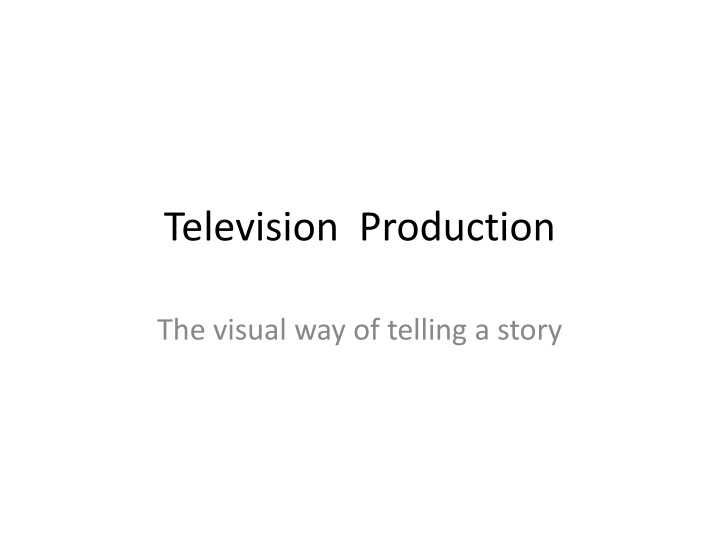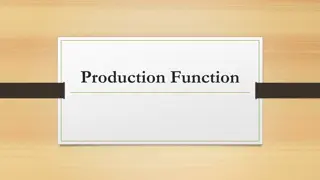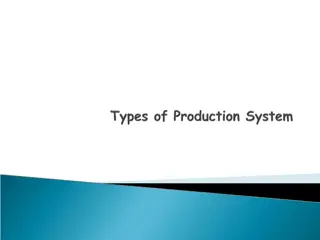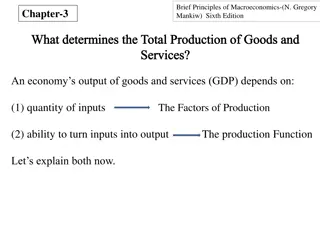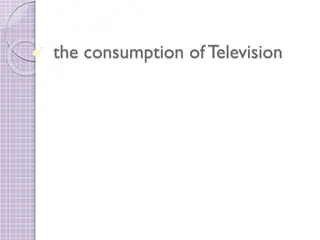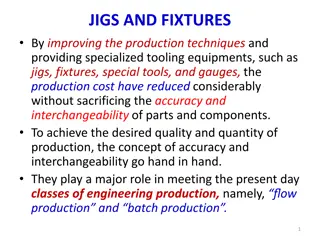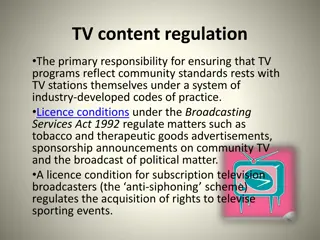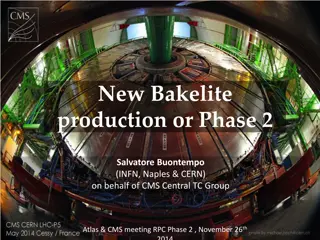Television Production
In television production, a producer plays a pivotal role overseeing various aspects from conception to completion. Responsibilities include scheduling, budgeting, talent management, and creative control. Producers collaborate with directors, manage project operations, secure funding, and ensure production within budget constraints. They lead the project from start to finish, working both in-studio and on location, with tasks ranging from raising funds to hiring key staff and controlling budgets.
Download Presentation

Please find below an Image/Link to download the presentation.
The content on the website is provided AS IS for your information and personal use only. It may not be sold, licensed, or shared on other websites without obtaining consent from the author.If you encounter any issues during the download, it is possible that the publisher has removed the file from their server.
You are allowed to download the files provided on this website for personal or commercial use, subject to the condition that they are used lawfully. All files are the property of their respective owners.
The content on the website is provided AS IS for your information and personal use only. It may not be sold, licensed, or shared on other websites without obtaining consent from the author.
E N D
Presentation Transcript
Television Production The visual way of telling a story
Introduction TELEVISION PRODUCER A television producer is basically the boss of a television program. The producer can be in charge of everything from the program s inception to post-production. Producers have a wide range of responsibility which includes scheduling, budget, talent management and creative control.
Responsibilities of Producer: Producers are the main players in the television, film and video industries. A producer will oversee each project from conception to completion and may also be involved in the marketing and distribution processes.
Responsibilities of Producer: Producers work closely with directors and other production staff on the shoot. Increasingly, they need to have directing skills themselves as the producer may also be the director and may take care of all project operations. Producers arrange funding for each project and are responsible for keeping the production within the allocated budget. Creative input and the level of decision making varies, as this is dependent on the client and the brief.
Typical work activities Producers are responsible for facilitating a project from beginning to end. They are involved in every stage of the television programme, film or video, overseeing the project from start to finish, both in the studio and on location. Essentially team leaders, they are supported by production assistants, coordinators and managers, depending on the size of the project.
Tasks include: raising funding; reading, researching and assessing ideas and finished scripts; commissioning writers or securing the rights to novels, plays or screenplays; building and developing a network of contacts; liaising and discussing projects with financial backers projects vary from a small, corporate video costing 500 to a Hollywood feature film at more than 100million; using computer software packages for screenwriting, budgeting and scheduling; hiring key staff, including a director and a crew to shoot films or videos; controlling the budget and allocating resources;
Tasks include: pulling together all the strands of creative and practical talent involved in the project to create a team; maintaining contemporary technical skills; organising shooting schedules dependent on the type of producer and availability of support staff; troubleshooting; supervising the progress of the project from production to post production; holding regular meetings with the director to discuss characters and scenes; acting as a sounding board for the director; bringing the finished production in on budget.
Conclussion In theory, the producer deals with all the practical and political aspects of keeping a project running smoothly, so that the director and the rest of the team can concentrate on the creative aspects.
